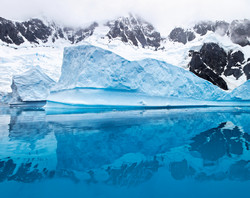EU researchers form world’s largest consortium of expertise and infrastructure for polar research
The EU-POLARNET (Connecting science with society) project team will work together for the next five years with the aim of developing and delivering a strategic framework and mechanisms to prioritise science, optimise the use of polar infrastructure, and broker new partnerships that will lead to the co-design of polar research projects. Ultimately, it is hoped that this new vision for polar research will deliver tangible benefits for society. Launched in March of this year, the project brings together 22 partners making it the world’s largest consortium of expertise and infrastructure for polar research. The project was presented at last month’s conference on the Atlantic Ocean in Brussels, The Atlantic – Our Shared Resource: Making the Vision Reality(opens in new window) by project coordinator Professor Karin Lochte from the German Alfred Wegener Institute in Germany. Speaking at the conference, Professor Lochte emphasised the importance of stakeholder exchange within the project. She noted, ‘The project will help to set the agenda for integrated polar research to implement the Transatlanic Research Alliance. We will offer a platform for knowledge exchange and stakeholder dialogue – from policy to industry to civil society.’ One of the main activities of EU-POLARNET will be working alongside the International Arctic Science Committee (IASC) and the Scientific Committee on Antarctic Research (SCAR) to develop and drive forward a European Research Programme that has clear strategic European science priorities and a distinct direction for the management and development of the necessary polar infrastructure. As Professor Lochte noted, ‘We hope to improve monitoring and modelling and to establish a stable observation basis with key parameters agreed by different nations. Our research priorities will be developed in discussion with the stakeholders who need our science.’ The team will also be working to provide central coordination for the management of polar data which has thus far been lacking at European level. Looking beyond Europe, the aim is for EU-POLARNET to also create links to data sets held by other polar nations, particularly those in North America, with a similarly long record of polar research. This includes determining the best approach to wider and more coordinated use of space-based assets, spanning satellite communication, navigation and observation to support European polar operators. The polar regions concern a huge range of nations and many diverse stakeholders so connecting with international partners and organisations will be an important aspect of the project. Although the project began just a couple of months ago, the team has already held its first General Assembly Plenary Meeting. Partners gathered in Bremerhaven in Germany in early March to determine a strategy for achieving the project’s ambitious goals. For further information, please visit: EU-POLARNET http://www.eu-polarnet.eu/(opens in new window)
Countries
Germany



